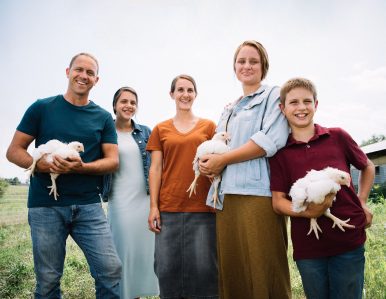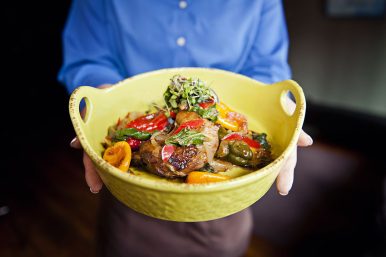

Harrisonburg-based indoor vertial farming company Soli Organic holds a 50% national market share in potted herbs. Photo courtesy Soli Organic

Harrisonburg-based indoor vertial farming company Soli Organic holds a 50% national market share in potted herbs. Photo courtesy Soli Organic
Agriculture powers valley jobs, investment
Maria Howard// August 30, 2023//
Prompted by shifts in consumer buying trends, Shenandoah Valley farmers are investing heavily in automated systems and cutting-edge growing processes to position themselves for the long haul in an industry that’s changing rapidly.
Once dubbed the “breadbasket of the South” because of its bountiful wheat crops, Virginia’s northwestern region has remained an agricultural powerhouse. But what that looks like, in real terms, is far different today than in years past, and is certain to evolve even more in the years ahead.
“Agriculture is one of those businesses that’s about to undergo a huge transformation,” says Matthew Ryan, the Harvard-educated CEO of Soli Organic, a Harrisonburg-based indoor vertical farming company. “We’re very much a part of the new way of doing things.”
Grocery shoppers are increasingly seeking more organic and fresh options. And going forward, producers will need a more educated workforce to manage sophisticated systems to produce and deliver those goods, Ryan says. “This is not just putting a hoe in the ground anymore.”
Across the country, large-scale farming has become highly automated. Advances in machinery and technology are allowing farmers to spend less on human labor and generate their products more efficiently. The upfront cost is often steep but deemed necessary to keep pace with consumer expectations. This shift is evident throughout the rolling hills of the Shenandoah Valley.
Soli Organic, formerly Shenandoah Growers Inc., uses indoor, soil-based farming techniques — with carefully controlled temperature and lighting — to produce organic herbs and greens for sale in more than 20,000 grocery stores across the nation.
In addition to its headquarters in Harrisonburg, Soli Organic has indoor farming operations in Culpeper. Together, the Virginia sites produce 75% of the potted herbs distributed by the companies, Ryan says, and Soli Organic holds a 50% market share in potted herbs nationally.
While Soli Organic has been actively expanding its national footprint with the help of $125 million in venture funding it secured last fall, the Shenandoah Valley is “very much a part of our past, present and future,” Ryan says. “We are in the logistics business. …Virginia has a great location near population centers on the Eastern Seaboard, and you can reach the Midwest from here, too.”
The region’s longstanding infrastructure supporting agricultural production is also a plus. “It works as an ecosystem, and that’s to our advantage,” Ryan says.
Growers such as Soli Organic aren’t the only ones employing new systems to be competitive. Poultry and dairy farmers, also mainstays in the Shenandoah Valley, are doing the same.
When people ask how many entrepreneurs are in the region, Jay Langston, executive director of the Shenandoah Valley Partnership, tells them, “We have 400-plus, and they’re called farmers.”
Langston applauds the advances made in the valley’s farming industry and credits the agricultural infrastructure with attracting other food and beverage operations, such as Hershey and Molson Coors, to take advantage of regional distribution systems already in place.
The valley is home to four of the state’s five largest agriculture-producing counties. Rockingham, Augusta, Page and Shenandoah counties are the leaders of the region’s agricultural base, producing more than $1.3 billion annually in commodities sold, according to the 2017 U.S. Department of Agriculture Census. In Rockingham alone, more than 13,000 jobs are related to agriculture.
“It’s very easily still the largest of our sectors,” Langston says. While manufacturing employs more people, many of those operations are linked to agriculture as well.
The agricultural base, with its storage and distribution options, laid the groundwork for the valley’s later development, he says. “We are trying to put a little more focus on the agricultural sector and all of these underlying, supporting sectors,” Langston adds. “I think we have taken it for granted to some extent.”
One of the biggest challenges for area farms is finding workers, he says. Family members often pick up where previous generations left off, but adding employees outside of the family can be difficult, Langston says. In many cases, farmers are forming partnerships with each other and finding ways to work smarter with their existing resources.
For instance, Harrisonburg-based Farmer Focus, formerly Shenandoah Valley Organic, emerged from its founder’s nagging worries over the future of his family poultry farm. Corwin Heatwole, a sixth-generation farmer, says he and his family were like many others in the business. “Our farm was our favorite place to be,” he says, but he was constantly mulling over an exit plan because the business wasn’t looking like a viable way to support future generations.
“That’s what inspired Farmer Focus,” which employs a partnership model that allows organic poultry farmers to own their own chickens, Heatwole says, with Farmer Focus handling processing, packaging and sales. Nearly 100 regional farmers partner with Farmer Focus, and more than 130 are on the waiting list. Farmer Focus products are sold in more than 3,100 stores along the East Coast and in the Midwest, including Publix, Kroger, Harris Teeter and Whole Foods.
The company this year embarked on a $17.8 million expansion of its Harrisonburg processing plant, aided by a $3.6 million United States Department of Agriculture grant. With the implementation of a new breast deboning process rolling out this fall, the company expects to add more partner farms and increase processing from about 400,000 chickens a week to 650,000, Heatwole says. Farmer Focus has grown to more than 700 employees since it was founded in 2014.

The company’s partner farms, all of which must be certified organic, non-GMO and humane, are seeing higher profits, he says. “Everyone wins because there’s a higher quality product as a result.”
It was the right time for a new poultry farming model, Heatwole says. “We see this next generation … that is more open to these practices than maybe their parents or grandparents were.”
It makes sense that farmers in the Shenandoah Valley, with their breadth of experience, are leading the way with new entrepreneurial approaches to agriculture, he says. “I couldn’t think of a better location … to build this out.”
In addition to its strong farming presence, the Shenandoah Valley is also home to a multitude of offshoot businesses that handle agricultural processing, packaging and distribution. This agribusiness sector also is expanding.
Warehouse and logistics company InterChange Group, for instance, is building out a cold storage facility in phases that could be as big as 600,000 square feet upon completion. With its initial phases opened in 2019, the Mount Crawford facility, just south of Harrisonburg off Interstate 81, is designed to serve the area’s growing food and beverage industries. InterChange also built a $40 million frozen fruit and vegetable processing and distribution facility in Front Royal in a partnership with Canadian supplier Nature’s Touch Frozen Foods.
InterChange President Devon Anders expects this type of project to continue in the region due to its growing agricultural and food/beverage industries as well as the tightened restrictions around food safety.
“One of the major reasons we got into cold storage was increasing food safety standards,” Anders says. “The conditions upon which you store and process food have tightened up a lot.” As a result, InterChange has invested in equipment to handle “blast freezing” and related services to meet these new demands.
Similar to InterChange’s foray into cold storage, Weyers Cave-based Houff Corp. has found ways to grow that don’t have much to do with the company’s start as a family farm that branched into selling liquid fertilizer to other area farms. Today, the company provides fertilizer, seed and other agricultural services, as well as industrial services such as shipping and logistics.
“Our business is diverse, and we do a lot of work for industrial clients,” says Neil Houff, president of Houff Corp. and a board member of the Virginia Board of Agriculture and Consumer Services.

He describes the valley’s agricultural industry as “evolving” in response to changes in consumer expectations and buying patterns. Some traditional, smaller mom-and-pop farms are disappearing while many large, commercial farms are expanding. For example, “There is a trend for those that remain [in dairy production] to get larger.”
But farms serving niche markets with products like high-end produce are also thriving, even if they’re on the smaller side, he says.
“It’s consumer-driven,” Houff says, adding that he’s also seeing “a continued slow shift from animal production to grain production.”
While the products and the players may continue to change, Houff believes the Shenandoah Valley will continue to grow in terms of food and beverage production. “The valley has always been very attractive to the food industry, and I think we remain very attractive,” he says.
Hershey Chocolate of Virginia, for instance, employs about 1,500 people at its Stuarts Draft plant. And Molson Coors Beverage runs its U.S. brewery in Elkton with 530 employees. Arizona-based dairy company Shamrock Farms opened a production facility in Verona in 2014 and a few years later invested more than $40 million to double the capacity at the plant, which sources milk from Virginia farmers. McKee Foods operates a bakery in Stuarts Draft, and international food company Cargill employs about 1,400 people in Rockingham County. The list goes on.
And in terms of farming, Houff is amazed at the industry’s modernization. He recently told his 96-year-old father the wheat production numbers of his nephew’s farm. “He just shook his head. … He couldn’t believe it. … There is a continued drive to perfection in the production of agriculture,” Houff says.
“I’ve been in this 37 years … and each generation takes it further.”
And between industry advancements and the proliferation of support services in the region, Houff and others expect that agriculture will continue to be a primary economic engine for the Shenandoah Valley for generations to come.
“I don’t see it changing,” Langston says.
Settled in the 1700s, the Shenandoah Valley lies between the Blue Ridge and Allegheny mountains, bisected by Interstate 81. The region includes Augusta, Bath, Highland, Rockbridge, Rockingham, Shenandoah, Page and Frederick counties, as well as the cities of Harrisonburg, Staunton, Lexington, Waynesboro and Winchester. Agriculture remains a key industry for the region, once known as the breadbasket of the South. Home to the Port of Virginia’s Virginia Inland Port in Front Royal, the valley has numerous logistics and food and beverage industries. It’s also a hub for higher education, including James Madison University, Mary Baldwin University, Virginia Military Institute and Washington and Lee University.
Population
373,472 (2021)
Top employers
Major attractions
The Shenandoah Valley is home to natural attractions such as Shenandoah National Park, the George Washington and Jefferson national forests, Natural Bridge and Luray Caverns. The region is also known for wineries and breweries, with the Shenandoah Beerwerks Trail and the Shenandoah Spirits Trail. Historical and cultural attractions include the Virginia Museum of the Civil War, the Museum of the Shenandoah Valley and the American Shakespeare Center’s Blackfriars Playhouse.
Top convention hotels
Boutique/luxury hotels
Notable restaurants